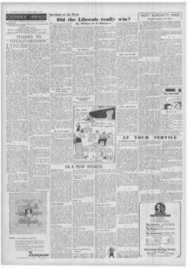Page 4, 3rd March 1950
Page 4

Report an error
Noticed an error on this page?If you've noticed an error in this article please click here to report it.
Tags
Share
Related articles
A National Catholic Organisation
Taunton's First Ever
At Your, Service
Douglas Hyde's 'weirowerneve6 Column
Douglas Hyde's Column
AT YOUR SERVICE By DOUGLAS HYDE
What is the best form of Catholic social organisation to meet modern needs?
T HE questioner seems to me to $ suppose that there is or should be a Catholic organisation which is the organisation and which is able to meet all requirements for modern Catholic Action, I do not think that there is such an organisation nor are we likely to have one. To me the question is rather as though some one asked: What is the best form of dinner, hors d'oeuvre, soup, thh,
or sweet ? I still like to think, despite everything, that all are required if one is to have a balanced meal. Still more, I believe, we need a great variety of organisations and varying forms of organisation to penetrate into every aspect of modern life.
I am frequently asked whether there arc not too many Catholic organisations in existence and is there not a danger of them treading on each others toes. My answer is always in the negative. I am not afraid of a multiplicity of active organisations—even their ability to tread on each others toes presupposes that they arc at least on the move.
To do the job of Christianising society we require every active organisation we can get, catering for every interest, devotional, social, charitable, cultural, industrial, or political. But each must have a sense of purpose, a clear idea of where it is going and how it fits in with all the other organisations. In this we can, as is often the case, learn from the Communists, who created a vast network of organisations and effectively use them all. That rather sweeping-sounding statement needs qualifying only in that they at once close down any organisation which has exhausted its usefulness and switch the members to other and more effective work.
In so far as there is a particular type of organisation which is needed above all others, therefore, I would say that what is required are bodies which will coordinate the activities of all those working together for similar ends.
Here and there such bodies exist in the form of parish councils, functioning on a purely parochial basis. In Glasgow the work of all the various organisations concerned with social questions are linked by a diocesan coordinating committee which must have increased the effectiveness of each by eliminating overlapping activities and clashing dates and by assisting all to see how they fit into the broader front in the fight
for a Christian society. Such coordination at diocesan level is obviously most useful and desirable.
Between the many existing Catholic organisations we have a wide variety of types from which to choose. In many ways the most
"modern" type is, I suppose, the so-called organisations of the milieu which have done such effective work on the Continent, the best known of which in Britain is the Young Christian Workers.
For older people there is the Catholic Action Cells Movement which, basing itself on the prayer, study and action technique, tackles anything from making the first contacts in a city or suburban " mission territory " which has no Church but is known to have many lapsed Catholics, to getting to grips with the local housing problem. For such bodies a good sense of discipline on the part of members is essential.
Modern in its conception, too, is the Sword of the Spirit, with its twoprong defence of Christian principles, carrying on the attack on
un-Christian totalitarian ideas through modern propaganda methods and local branch discussions and activities.
Fitting in completely with the modern mood and urgent needs is the Association of Catholic Trade Unionists (ACTU), whose leaders would be the first to acknowledge that it has as yet only barely touched the fringes of its possibilities. Given the support of every Catholic trade unionist, actual and potential, it could be the fount from which a constant' stream of new and Christian ideas could be flowing into the millions-strong trade union movement.
But to engage in any such activities as those already touched upon is to be made aware of the need for a better understanding of Catholic social teaching and for the services of the Catholic Social Guild. Important there, for both teachers and taught, I would say, is to keep classes closely related to the needs of the day and for their immediate usefulness to be apparent to both.
Despite all " modern" needs and methods the charitable work of the Society of St. Vincent de Paul remains a glorious example of Catholic social activity, still necessary today in the Welfare State, and a constant reminder that true Christian charity is and must remain infinitely superior to all the State benevolence.
But to name organisations in this way is indivious and serves only to show how rich we are in organisations, all of which have a big and urgent job to do.
II William Gallacher, the Communist, was so good at taking up his electors' problems, regardless of who or what they were, wasn't it wrong of Catholics to work for his removal front Parliament?
0. The Catholic case against Gallacher, as with other Communists, was a spiritual one. It is the atheism and essential immorality of Communism that the Catholic must oppose. To ignore them in order to gain some purely material benefits is a denial of everything for which we stand.
Rut if Catholics work for the removal of Communists they should also accept the responsibility of training people to do the job even better than the Communists—but (or the love of their fellow-men and the greater glory of God.
blog comments powered by Disqus









